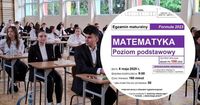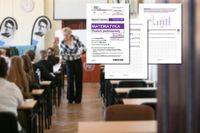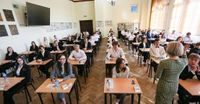On May 6, 2025, high school graduates across Poland sat for the Matura exam in mathematics at the basic level, a crucial step in their academic journey. The exam, which began at 9:00 AM and lasted for 180 minutes, tested students on a variety of mathematical concepts and problem-solving skills.
The Matura mathematics exam consisted of a variable number of tasks, ranging from 7 to 13 open-ended questions, alongside a series of closed tasks. A passing score of at least 30% is required to successfully complete the exam, a threshold that many students felt confident about achieving.
Bartłomiej Wajdowicz, a student from class 4c at III LO in Krakow, expressed satisfaction with the exam's difficulty level. "The tasks were quite simple, but I’m taking the extended math exam, so the basic level isn’t a big challenge for me. The questions were similar to those in previous years, including logarithms and systems of equations. For someone well-prepared, two hours were enough to solve all the tasks," he stated.
However, not all students shared Bartłomiej’s confidence. One student, who preferred to remain anonymous, described the exam as challenging. "I’m relieved that I’m pursuing humanities studies where math won’t be required anymore. My main goal is just to pass the exam," she said.
In contrast, Amelia, a student from the Zespół Szkół Inżynierii Środowiska i Melioracji in Krakow, found the exam manageable. "It was easy. The tasks were very similar to those on the practice exam. There were no surprises, and anyone who did honest revisions shouldn't worry," she remarked.
Dawid Solarski from class 4D at III LO felt optimistic about his performance, believing he did better in mathematics than in Polish. "The tests in class were harder than the tasks on the basic Matura math exam. I think if I didn’t make a mistake with a negative sign, I might even score 100%," he shared with a hint of excitement.
Students were allowed to use a set of mathematical formulas, a compass, a ruler, and a simple calculator during the exam. The tasks covered a wide range of mathematical skills, including operations on real numbers, solving equations and inequalities, understanding functions and their properties, and knowledge of the Cartesian coordinate system.
The exam also included questions related to arithmetic and geometric sequences, calculating probabilities, and determining averages, medians, and modes. One of the highest-rated tasks involved calculating the length of the edges of a cuboid while also determining the formula and domain of the total surface area function of the cuboid.
The Central Examination Board (CKE) published the exam papers at 2:00 PM on the same day, providing students and educators the opportunity to review the tasks and solutions. The publication included 31 questions that tested various mathematical competencies.
As the students completed their math exam, they were reminded of the importance of relaxation and mental preparation for the upcoming challenges. Jacek Kaczor, the director of I LO in Krakow, advised students to come well-rested. "The most important thing is to get a good night's sleep before the exam, as it can translate into a few extra percentage points if the students are well-rested. The night before the exam, it’s better to watch a good movie to unwind rather than study," he recommended.
The Matura exam schedule for 2025 includes critical dates for the first three days: Polish language on May 5, mathematics on May 6, and a modern foreign language on May 7. Each student must take three compulsory written exams at the basic level and one written exam at an advanced level, which can be selected from various subjects.
This year marks a return to a more traditional examination format based on the curriculum requirements rather than the modified requirements implemented during the COVID-19 pandemic. Graduates must take mandatory written exams in Polish, mathematics, and a foreign language, along with at least one additional subject at an advanced level.
In Małopolska, the most popular additional subjects chosen by this year’s graduates include English, mathematics, Polish, geography, biology, chemistry, history, social studies, computer science, and physics. The results of the Matura exams will be announced on July 8, 2025, a date that many students are eagerly anticipating.
As students navigate through this pivotal moment, they are reminded that the Matura is not just a test of knowledge but a stepping stone towards their future academic pursuits. Whether they are headed into humanities or sciences, the skills gained through these examinations will serve them well in their next endeavors.






